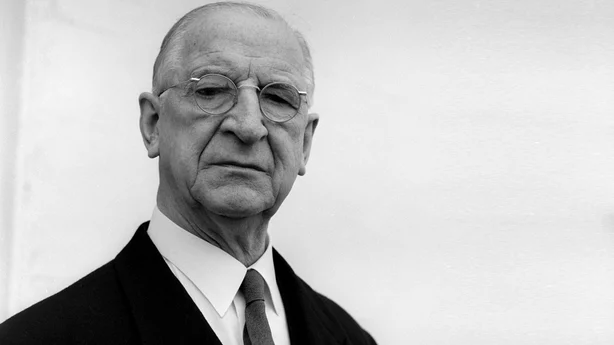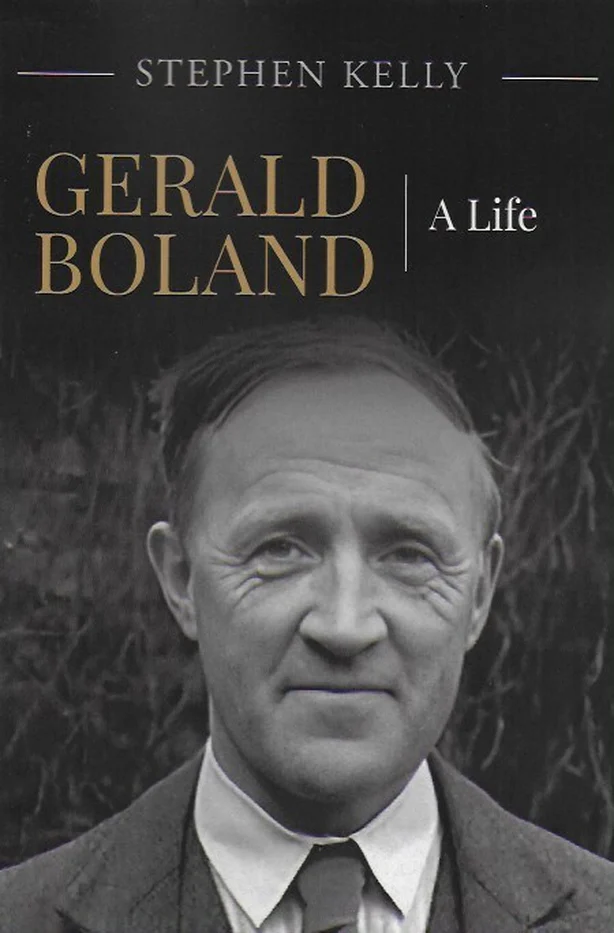Gerald Boland has been, as Stephen Kelly notes at the start of this fine biography, a neglected figure in Irish history. Overshadowed to some extent by his more glamorous younger brother Harry, and by some of his more prominent (or, in his view, publicity-seeking) Fianna Fáil colleagues, his story is nonetheless a fascinating one.
He was both the longest-serving Civil War internee, and the longest-serving Irish Minister of Justice – a most unusual combination.
Boland was unusual in other ways, too. As a member of the pre-Rising Irish Volunteers, like some others he renounced alcohol and tobacco to prepare himself for the fight ahead. But unlike most of his contemporaries, he also gave up meat and dairy products. There can't have been too many vegans in Ireland at the time – nor practitioners of yoga, another of his pursuits.
He was far from being an orthodox Catholic either, another thing which marked him off from his contemporaries. According to his family, he was interested in Eastern philosophy and in Buddhism, Krishnaism and Confucianism. However, having examined the alternatives, he finally decided his children should be brought up as Catholics.
If his intense nationalism was less out of step with contemporary Ireland, he did have unusually deep roots in the Fenian tradition, with members of both sides of his family being involved in the IRB, his father James being particularly prominent in the organisation, as well as the GAA. He was also a supporter of Parnell, suffering a brain injury in a fight with anti-Parnellites (some versions have it that he was actually protecting Parnell when he was struck), which contributed to his early death.
So it was no surprise that Gerald (he hated being called Gerry) was active in the GAA, the Gaelic League, and the Irish Volunteers when they were founded. He fought in the Easter Rising, in the War of Independence, and took the anti-Treaty side in the Civil War. He was a founder member of Fianna Fáil, an effective and strict party Chief Whip, and later a minister in various portfolios for over two decades, most notably in the Department of Justice.
He was both the longest-serving Civil War internee, and the longest-serving Irish Minister of Justice – a most unusual combination.
Boland was clear-eyed and pragmatic, ruthless when necessary, obstinate when he wanted to be, and always spoke his mind, to the discomfort of his colleagues and of his leader, Éamon de Valera.
His pragmatism was on display on a number of occasions. Despite his intense republicanism, and despite the death of his beloved brother Harry in the early stages of the Civil War, he felt the anti-Treaty side should have given up the fight after being driven out of Dublin and other major cities, as continued violence could achieve nothing.
In the mid-1920s he supported de Valera’s attempts to drop Sinn Féin’s policy of abstaining from the Dáil. In fact, at the crucial party Ard Fheis which voted on the issue, he claimed he persuaded delegates to vote against de Valera, in the hope that it would lead to a split, so the pragmatists could escape from the clutches of Republican purists.
He was one of the key figures in the subsequent establishment and development of Fianna Fáil, and along with colleagues persuaded de Valera (with great difficulty) to enter the Dáil in 1932.
While his pragmatism led him to support involvement in the political institutions of the Free State, it certainly didn’t dilute his opposition to Partition: in Cabinet he vociferously opposed the Agreement de Valera reached with Britain in 1938, which ended the Economic War and returned the Treaty Ports to Ireland, because nothing was done about the border.
He also strongly and successfully opposed de Valera’s original clause on religion in an early draft of the 1937 Constitution, which would have recognised the Catholic church as the "one true faith"; he regarded this as sectarian, saying if it was included, it would expel Protestant patriots like Tone and Parnell from Irish history. He claimed he told de Valera that if it was passed, he would not alone resign, he would emigrate. De Valera wisely diluted the wording.

de Valera (still President) attended his removal in 1973, reportedly
weeping over Boland’s coffin and saying: "You were always the boss".'
It is, however, as wartime Minister for Justice that Boland is best remembered, particularly for his crushing of what he referred to as the "new IRA". It wasn’t just a question of asserting the authority of the State – in the midst of the Second World War, IRA collaboration with the Nazis was extremely dangerous, as it could provide the Allies with an excuse for invasion. Boland – a former hunger-striker himself - resolutely opposed the release of hunger-striking prisoners and insisted on the execution of IRA men convicted of the murder of Gardaí.
The decisions he took caused him sleepless nights and earned him the hatred of IRA supporters. Some saw him as ruthless, others as a poacher turned gamekeeper, but he regarded his actions as absolutely necessary to keep Ireland out of the war.
He continued as Fianna Fáil Minister for Justice until 1948, and again from 1951 to 1954 (when he introduced legal adoption for the first time), but he was not reappointed when de Valera returned to government for the last time in 1957. Boland had developed a bitter animosity towards Seán Lemass and James Ryan (which was reciprocated), and blamed them for persuading de Valera to drop him. De Valera, three years older than Boland, could hardly cite his age as a reason for demoting him, so he sweetened the pill for his old friend by telling him he was appointing his son, Kevin, to Cabinet (on his first day in the Dáil).
Gerald Boland lost his Dáil seat in Roscommon in 1961, but served a further two terms in Leinster House as a Senator, before finally bowing out of politics in 1969.
When the Troubles erupted just months later, Kevin Boland was on the hawkish, Republican wing of the Fianna Fáil party; so was his father. Gerald publicly advocated the arming of "commando parties" to be sent to defend northern Nationalists. As Stephen Kelly writes, the "poacher who had turned gamekeeper during the Second World War had in his final years resumed the role of poacher".
Kevin resigned from Government in protest at Jack Lynch’s sacking of Charlie Haughey and Neil Blaney over the Arms Crisis. He eventually left the party too, and his father followed suit, resigning as vice-president and trustee of Fianna Fáil. Despite Gerald Boland’s bitter rift with the party he helped to found, de Valera (still President) attended his removal in 1973, reportedly weeping over Boland’s coffin and saying: "You were always the boss".
Whatever about that, Gerald Boland is a significant figure in Irish history who has been neglected too long. With this interesting biography, Stephen Kelly has put that right.

Gerald Boland: A Life, Eastwood Books.
Disclaimer: The copyright of this article belongs to the original author. Reposting this article is solely for the purpose of information dissemination and does not constitute any investment advice. If there is any infringement, please contact us immediately. We will make corrections or deletions as necessary. Thank you.






